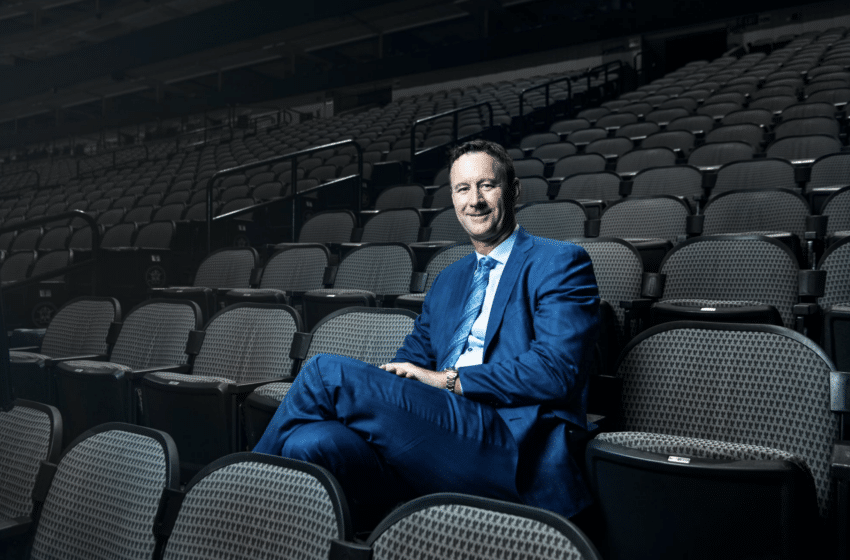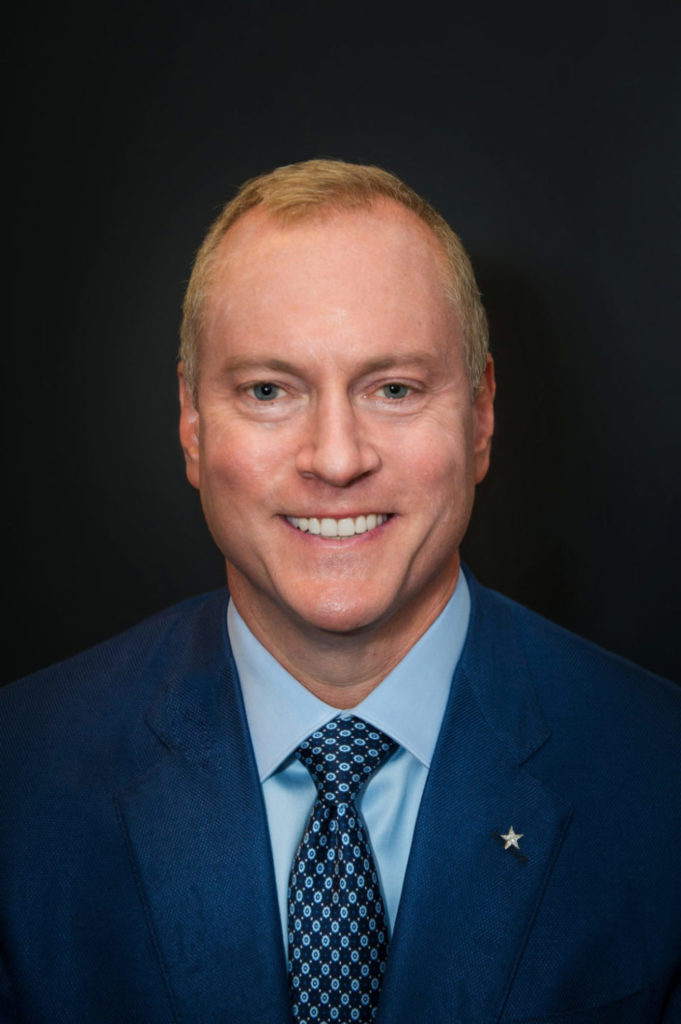The Iceman Cometh

Brad Alberts, president and CEO of the Dallas Stars, is making ice hockey a viable business in blazing-hot Texas. And he’s intent on diversifying hockey’s fan base while he’s at it.
When I recently sat down with Dallas Stars’ head honcho Brad Alberts, his long-running hockey franchise had just shared some big news.
The previous day, the National Hockey League announced that the Stars would play in the 2021 Kraft Hockeyville game—an annual competition that takes place in a city that hoping to prove its enthusiasm for the sport of ice hockey.
It was a big win for the Stars on multiple fronts.
First, it’s the kind of highly publicized event that Alberts loves, a vehicle for winning new fans of ice hockey in Texas. Second, this year’s winning host city was El Paso, so the game would take place less than a mile from the US–Mexico border. That’s very important for Alberts, who hopes to grow ice hockey participation in Spanish-speaking communities.
“We’re trying to be Mexico’s team,” he said. “We’ve already told the NHL we ultimately want to play a regular-season game in Mexico City.”

As winner of the contest to host the Kraft Hockeyville game, El Paso received $160,000 in rink upgrades and equipment as part of the prize. The Stars ultimately went on to lose the October 3 matchup to the Arizona Coyotes, but Albert still counts it as a step toward the Stars’ long-term goals.
As we spoke in Alberts’ office, which overlooks the Stars’ practice rink in the Comerica Center in Frisco, we were joined by a brand-new hire: 36-year-old former NHL goaltender Alvarez “Al” Montoya.
Montoya is serving in the newly created position as Director of Community Outreach. He was the first Cuban American and Spanish speaker to ever play in the NHL.
“I didn’t know if these doors would ever open for me,” said Montoya. “Hockey has been my life. It gave me so much, but for a long time I didn’t think I was going to ever be back in hockey, which would have been a shame. People need to see a Montoya in the office as much as they need to see a Montoya on the ice. And Brad gave me that opportunity. The Stars gave me that opportunity.”
“That’s beautiful,” said Alberts.
“I’m getting emotional now,” echoed Montoya.
Alberts has tasked Montoya with mainstreaming ice hockey among under-represented groups, particularly Hispanics, who comprise over 40 percent of Dallas’ population.

“If you look on the ice right now,” said Alberts, “we have Russians, Swedes, Finns, Czechs, Canadians. They’re just white, but they’re from all these different cultures. And so I think we have an incredible diversity story to tell. What we’re trying to do here in Dallas is to make the sport more representative of the city. We don’t live in Helsinki. We live in Dallas.”
51-year-old Alberts knows and loves Dallas, crediting his move to Big D 26 years ago as the greatest decision he’s ever made.
“I met a woman and she was here, and she brought me to Dallas, and I got a job with the Stars as a 25-year old kid. It was the greatest thing that ever happened, because it changed my complete trajectory and mentality.”
Alberts grew up playing sports in Southern Wisconsin, where his father was a high school basketball coach. He always wanted to work in sports, but he thought he’d wind up coaching or being an athletic director. Instead, the eventual CEO started his career selling tickets for the Stars, making $12,000 a year with commission.
“My wife and I laugh about it. But yeah, I’ve seen it all.”
The Stars’ Dallas history begins in 1993, when the team relocated from the Twin Cities up north. Previously known as the Minnesota North Stars, the team kept the “Stars” moniker—it certainly fit in the Lone Star State.

The team saw a wave of initial success in its new Texas home. “If you were around Dallas in those days, we were rock stars. We were the Beatles around here. We were bigger than the Cowboys in Dallas at that time. We were the best team in the NHL from ’98, ’99 and 2000. And so, I saw us at the peak, and then I’ve seen us at the bottom.”
Alberts is referencing the team’s descent into bankruptcy and auction, which started after the 2008 recession hit then-owner Tom Hicks particularly hard. Seeing the writing on the wall, Alberts left in 2009 for a job as VP of Sponsorship and Sales with Legends Hospitality, then a new company created by Dallas Cowboys owner Jerry Jones and New York Yankees owner George Steinbrenner. When he was asked to come back to the Stars under new ownership in 2012, he met with CEO Jim Lites to look at the financials.
We’re bursting at the seams. We built eight sheets of ice in this city over the last 20 years.
“This place was bankrupt. It looked like it, it felt like it, and the numbers reflected it.”
But Alberts wasn’t deterred.
“I knew it was going to be incredibly difficult to dig out of the hole, and it was . . . but we did. We dug out of a monumental hole.”
The Stars focused on improving facilities and winning games, but they also focused on winning lifetime fans, using the Stars Foundation to build ice rinks and participation in youth hockey leagues, particularly among girls and minorities.
“Now, we need more ice in the city, to be honest. We’re bursting at the seams. We built eight sheets of ice in this city over the last 20 years. We run the sport. High school hockey went from a couple teams to 60 on our watch.”
Alberts points me to a framed photo of a packed Cotton Bowl Stadium with an ice rink where you’d expect to see a football field.
“I think that moment when we brought that hockey game to the Cotton Bowl, sold it out like we did—that really stamped that we were back.”
“A coup?” I asked.
“Oh yeah,” he said. “Other than winning the [Stanley] Cup in ’99, that’s our greatest day in franchise history.”
The photo depicts the sold-out Winter Classic, played on January 1, 2020, at the Cotton Bowl. The Classic is a game played outdoors each year since 2008 around New Year’s Day, and one of the NHL’s premier hockey traditions. It is normally hosted in a traditional hockey town. A cold hockey town. A town where outdoor ice rinks seem more . . . natural. But Alberts wanted it in Dallas.
He first floated that dream when league officials were in town for the 2018 NHL draft. Not long after, when he had landed the deal, he says the NHL commissioner Gary Bettman gave him one directive.
“Brad, don’t f— it up.’ That was his exact quote,” said Alberts. “I’m like, ‘Thanks, Gary. I appreciate that.’ And you know what? I knew we wouldn’t. I had all the confidence in the world that this group would be able to execute and come with a great plan. I knew Dallas like big stuff and big events.”
He was right. Tickets to the Winter Classic sold out in three days, and they had to add seats. Thankfully, the weather also cooperated. By 9:00 a.m. before the game’s noon start, Alberts—then serving as the team’s executive vice president and chief revenue officer—says he walked down on the ice and about 30,000 people had already shown up. The Dallas Stars defeated the Nashville Predators 4–2 that day, in front of more than 85,000 fans, the first time either NHL team had played an outdoor game.
Again, Alberts points to the picture on his wall.
“That’s why I have it in here, because I get to look at that every day and go, ‘We made it. We did that.’ It’s a great picture.”
We all know what happened shortly after that picture was snapped in January 2020. With Alberts and team hoping the success of the Winter Classic would translate into increased ticket sales, the worldwide COVID-19 pandemic dramatically scuttled the existing plan.
Then, in July of 2020, as the pandemic raged, Alberts was promoted to president and CEO, his dream job, just not at the dream time. Furloughs and pay cuts followed. Games were played in audience-less bubbles, and his previous forte—ticket sales—meant little in a world without live spectators.
“I don’t even worry about selling tickets right now. It’s like tenth on my priority list.”
Alberts says patience has been his biggest pandemic leadership lesson.
“Patience, patience, patience, with process and with people. Every CEO has had to deal with unprecedented stuff that no business school, no experience could ever have prepared us for. You have to be really flexible and nimble and patient.”
Alberts describes his leadership style as collaborative, with a strong focus on culture, which he says is critical given the open layout of their headquarters.
“I like to say we live in one big room. So if you have a bad culture and you have bad apples in this room, you’re going to have problems. It’s not like you can escape. We’re on top of each other. And we’re in very emotional and intense situations. Games are emotional. There’s a lot of times when you’ve got to pull back on the emotions. You can’t let your frustration with team performance turn into something that creates a bigger problem. We have people who cover us on a daily basis, so they’re looking for things.”
Part of the emotion comes from the fact that victory on the rink translates to business success. “We need to win in order to make the business work. In hockey, winning takes on a much more important kind of role because financially, we’re really tied to team performance. You can make the argument that other sports aren’t as much. We are. So it puts that much more pressure on it, which means, again, you have to be that much more patient.”
Being measured and patient with staff are leadership skills Alberts seeks to hone, but when it comes to team goals and vision, there’s no holding him back.
“I want to do big things, and I’m a big thing thinker.”
We need to win in order to make the business work. In hockey, winning takes on a much more important kind of role because financially, we’re really tied to team performance.
It takes big boots to sell ice to Texas, right in the backyard of giants like Mark Cuban and Jerry Jones. I asked if he was confident or maybe a little crazy.
“You have to have big vision if you’re going to run companies. I mean, the Dallas Stars in Dallas, Texas, we compete against the biggest and the richest professional sports franchise in the world, and they happen to be right across the street. You cannot look small and act small in this city. This is a big-time city. We need to think big. We need to act big. We need to execute big.
“In a football-crazed city and state, with the Cowboys across the street, it’s easy to just slide in and go, ‘Yeah, we’re just hockey. We’re going to accept our life.’ No, we are not,” he says with emphasis. “We’re going to be big, and we’re going to be big in our own way.”
Despite competition from the Cowboys and Mavericks, Alberts cites the corporate market in Dallas as a significant benefit to the franchise.
“The support that we get from the business community here is incredible. We’re a top 10 corporate sales market in the NHL. That has a lot to do with the fact that we’ve got really good people here, and we have for 20 years. But it’s also the market and the fact that Toyota’s around the corner. We don’t lose sight of that. That is a huge blessing that we know we have.”
Alberts says Dallas also provides taxation and cost-of-living benefits, which help attract NHL free agents.
“Dallas is a great city. People like to live here. It’s big and there’s a lot to do. Also, the way we’ve run Texas, from a government perspective, over the last 20 years has been a significant benefit to us as well.”
One windfall Alberts would like to see soon is the legalization of sports betting. Alberts says he doesn’t want Texas to be the 50th state to that “game changing” party, because of the enormous competitive disadvantage for states without that increased revenue.
“Our take is, Donna, everybody’s betting anyway. The state’s not capturing any of that revenue though. It’s going elsewhere. Everybody who wanted to bet last night on the Cowboys. That money went offshore. We’re like, ‘Guys, this is happening right in our state. Why don’t we capture it?’ We do have this pro-sports coalition. Everybody’s united in getting sports betting passed. I think there’s some mixed feelings on casino gaming, but that’s where the political winds are blowing.”
Getting sports betting passed is high on Albert’s list of future goals, in addition to the ones we’ve already discussed. And most of those goals, like one of his favorite words, are “big.”
“We’ve got a 20-year-old arena, no different than a 20-year-old house. It needs renovation. We need to plot out the future. That’s a big strategic project. And then, probably the third big initiative is the changing nature of media and what’s going to happen in our next media negotiation. Things are dramatically changing, as you know, with how people view TV. It’s going to be good for the consumer. The issue and the question is, How’s it going to change the economics of pro sports? That has me a little concerned, a little nervous. So we’ve got to see that through. And I want to win the Stanley Cup again here bad, really bad.”
Alberts speaks with great confidence when talking about both his and the Star’s futures.
“I don’t want to be cocky, but I want to have swagger. I want to be confident in who we are and what we’re trying to do. We’re not going to act like a minor league team in a big city. We have great respect for our neighbors and our partners. But we feel like we can stand right there toe to toe.”
“Or boot to boot?” I suggest.
“Or boot to boot.”
At the end of the day, Alberts is grateful but aware of the pressure he’s under. “I’ve had a very blessed life. I’m very lucky and I know it. That’s why I feel very honored to be here in this position. There’s a lot of great weight that comes with it.”
He finds himself echoing the directive from the NHL commissioner:
“Don’t f— it up, Brad. Don’t f– it up.”







1 Comment
Brad,
Very proud of all your accomplishments, very happy to call you my friend. Best of luck in the future.